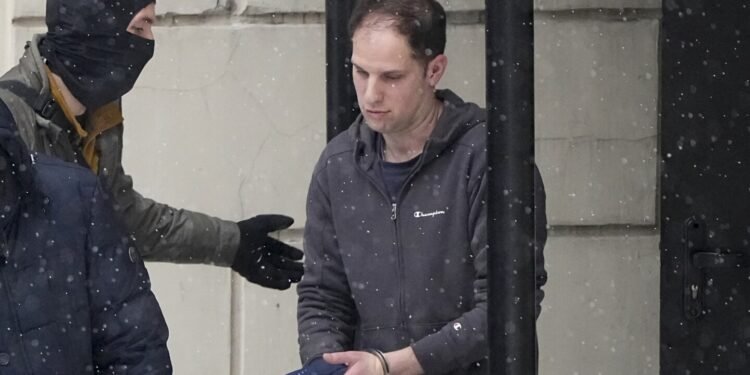TALLINN, Estonia (news agencies) — A journalist on a reporting trip in a Ural Mountains city. A corporate security executive traveling to Moscow for a wedding. A dual national returning to her hometown in Tatarstan to visit her family.
All of them are U.S. citizens, and all are behind bars in Russia on charges of varying severity.
Arrests of Americans in Russia have become increasingly common as relations between Moscow and Washington sink to Cold War lows. Washington accuses Moscow of targeting its citizens and using them as political bargaining chips, but Russian officials insist they all broke the law.
Some have been exchanged for Russians held in the U.S., while for others, the prospects of being released in a swap are less clear.
“It seems that since Moscow itself has cut off most of the communication channels and does not know how to restore them properly without losing face, they are trying to use the hostages. … At least that’s what it looks like,” said Boris Bondarev, a former Russian diplomat who quit after Moscow invaded Ukraine in 2022.
Friday marks a year since the arrest of Evan Gershkovich, a 32-year-old reporter for The Wall Street Journal who is awaiting trial in Moscow’s notorious Lefortovo Prison on espionage charges.
Gershkovich was detained while on a reporting trip to the Ural Mountains city of Yekaterinburg and accused of spying for the U.S. Russian authorities haven’t revealed any details of the accusations or evidence to back up the charges, which he, his employer and the U.S. government all deny.
Another American accused of espionage is Paul Whelan, a corporate security executive from Michigan. He was arrested in 2018 in Russia and sentenced to 16 years in prison two years later. Whelan, who said he traveled to Moscow to attend a friend’s wedding, has maintained his innocence and said the charges against him were fabricated.
The U.S. government has declared both Gershkovich and Whelan to be wrongfully detained and has been advocating for their release.
Others detained include Travis Leake, a musician who had been living in Russia for years and was arrested last year on drug-related charges; Marc Fogel, a teacher in Moscow, who was sentenced to 14 years in prison, also on drug charges; and dual nationals Alsu Kurmasheva and Ksenia Khavana.
Kurmasheva, a Prague-based editor for the U.S. government-funded Radio Free Europe/Radio Liberty’s Tatar-Bashkir service, was arrested October 2023 in her hometown of Kazan, where she traveled to see her ailing elderly mother. She has faced multiple charges, including not self-reporting as a “foreign agent” and spreading false information about the army.
Khavana, of Los Angeles, returned to Russia to visit family and was arrested on treason charges. According to Pervy Otdel, a rights group that specializes in treason cases, the charges against her stem from a $51 donation to a U.S. charity that helps Ukraine.
The precise number of Americans jailed in Russia is unclear, but the cases of Gershkovich and Whelan have received the most attention.
Gershkovich was designated as wrongfully detained by the State Department less than two weeks after his arrest, unusually fast action by the U.S government. The designation is applied to only a small subsection of Americans jailed by foreign countries.
Prisoners who get that classification have their cases assigned to a special State Department envoy for hostage affairs, who tries to negotiate their releases, and must meet certain criteria — including a determination that the arrest was done solely because the person is a U.S. national or as part of an effort to influence U.S. policy or extract concessions from the government.
The U.S. has had some success in recent years negotiating high-profile prisoner swaps with Russia, striking deals in 2022 that resulted in the releases of WNBA star Brittney Griner and Marine veteran Trevor Reed. Both Griner and Reed were designated as wrongfully detained.
In the exchanges for them, Moscow got arms dealer Viktor Bout, who was serving a 25-year sentence in the U.S., and pilot Konstantin Yaroshenko, given a 20-year prison term in the U.S. for cocaine trafficking.
It’s unclear whether there are any negotiations in the works on swapping other Americans held in Russia, such as Leake, Fogel, Kurmasheva or Khavana.
Kurmasheva’s husband, Pavel Butorin, told media shortly after her arrest that he hoped the U.S. government would use “every avenue and every means available to it” to win her release, including designating her as a wrongfully detained person.
In December, the State Department said it had made a significant offer to secure the release of Gershkovich and Whelan, which it said Russia had rejected.



 Pakistan Rupee Exchange Rate
Pakistan Rupee Exchange Rate





